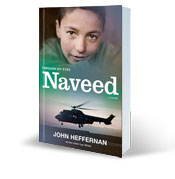Review: Through my eyes: Naveed

“Naveed” by John Heffernan is the second in the “Through my eyes” series of novels set in war zones, told from the perspective of children caught in such conflicts. “Naveed” is set in Afghanistan, a war we have heard so much about, but in reality know so little of the suffering of innocent people caught in the crossfire.
Naveed, the main character, is totally tired of the war tearing his country – and family – apart. His father is dead, yet another victim of the war. Yet it is Naveed, his sister Anoosheh and his mother who are the real victims. His sister lost her legs when a land mine exploded and his mother cares for them as best she can in a small rented room. There is the constant battle for enough money for food and for their greedy landlord.
Naveed works the markets, taking whatever jobs are on offer, in an effort to care for his mother and sister. Too often he is the target of street gangs until he adopts a street dog Nasera. The dog quickly becomes not only a protector from the gangs, but also one displaying extraordinary abilities. Befriended by an Australian soldier, Naveed and Nasera team up to make a difference to the people living around them.
“Naveed” is a fast moving, exciting story giving a close up view of life in modern Afghanistan in the midst of a terrible conflict. The main characters, Naveed and his family, are strongly drawn characters one immediately cares for, and as the plot develops a sense of foreboding looms – with a totally believable outcome. The ending brings a sense of hope for the future of this ravaged country and its people.
Highly recommended.
“Naveed” is published by Allen & Unwin.
Teachers’ notes and an interview with the author can be found here.
Forgetting the obvious
Late last week our next door neighbour asked permission to enter our property over the weekend. He was planning to trim some of our trees leaning over his fence. Not only would this be much tidier, it would reduce the fire hazard on his property, something we have to be very aware of here in South Australia, especially as another summer is approaching rapidly.
As he started Friday afternoon I went over to chat to him, asking for more details on what he proposed to do. One of the tools he had hired was a chainsaw with a long extension arm on it. At full extension he could reach nearly 5 metres while standing safely on the ground. I immediately saw the potential regarding one tree in our garden.
I had forgotten the obvious.
A few months ago I had tried climbing up a ladder to lop the top two thirds of a tree near the house. From about two in the afternoon this tree shades our PV solar panels, diminishing their efficiency for the rest of the afternoon. Even cutting this tree to the base will not kill it. In fact, mallee trees thrive on this trimming and will regrow quickly. My attempt to trim the tree was unsuccessful; it was unsafe at that height.
I had forgotten the obvious.
The obvious solution was to hire one of those very useful chainsaws with an extension. Doh. I offered to help my neighbour in his trimming – if he would come over and trim my tree. In about ten minutes the job was done. I then spent the next few hours helping him in return, offering to tidy up after him cutting and getting rid of the cut wood. Next winter we will keep warm with this wood.
Forgetting the obvious
When we are writing we can so easily forget the obvious. We blaze away writing a story, poem, article or novel and then shoot the manuscript off to a publisher. Then we wonder why it didn’t get accepted when it returns many months later. Some of the obvious things we forget include:
- Proofreading for spelling errors.
- Checking that the grammar is correct.
- Rewriting repetitive or hard to understand parts.
- Checking the publishers requirements; don’t send a poem to a car enthusiast’s magazine – unless they specifically are asking for poems about cars.
- Check the maximum (and often the minimum) word count required; this is especially important in writing competitions.
- Get someone else to read your writing, checking for understanding, grammar and spelling. And typos.
- Keep a copy of your work.
- Check you’ve included your name and contact details.
- Keep writing. Don’t twiddle your thumbs while waiting for the publisher to reply; it could be months!
Good writing.


